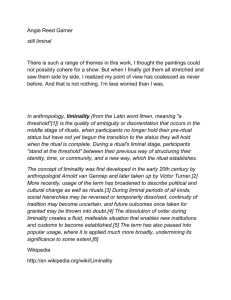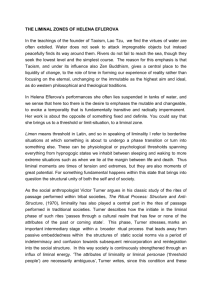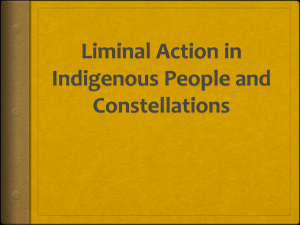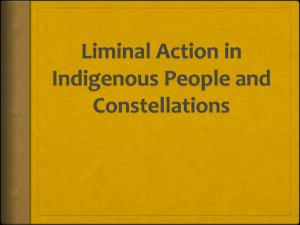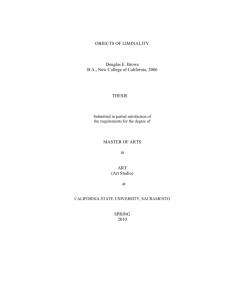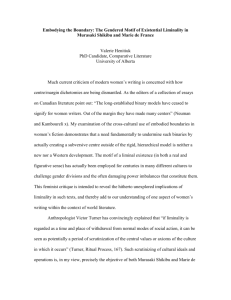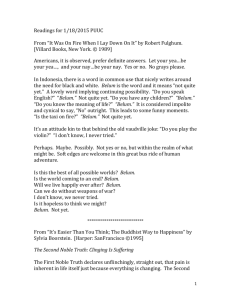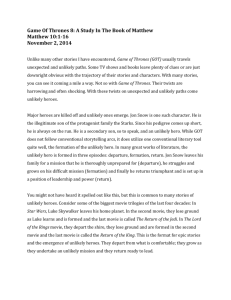Liminality is
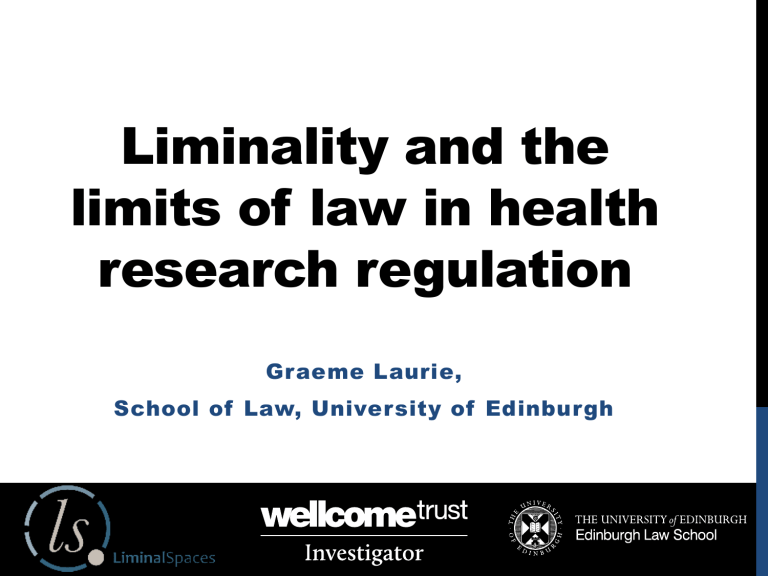
Liminality and the limits of law in health research regulation
Graeme Laurie,
School of Law, University of Edinburgh
Overview
• The metaphors and processes of regulatory ‘space’ and ‘translation’
• Regulation and transition : the value of liminality
• care.data
: where is the human in human health research?
• Health research as a transformative experience
• Who, or what, experiences liminality? (and so what?)
• Imagining liminal regulatory spaces
Regulatory space(s) in human health research
• Regulated ‘objects’: ‘data’/ ‘tissue’/ ‘embryos’ / ‘devices’ /
‘ATMPs’/ ‘clinical trials’
• Bounded by law and regulatory silos
• The ‘consent or anonymise’ paradigm
• ‘Interests’ » ‘inter’ + ‘esse’: between beings …
• More public engagement, more ethics, and more law
• And yet…
care.data
: an exercise in regulatory failure?
• Health and Social Care Act 2012
• Individual level patient data from GPs for six purposes, including commissioning and research
• The ‘consent or anonymise’ paradigm » anonymise
• Leaflets to 26.5 million households
• Suspended in February 2014 for want of social licence
• Legal authority does not command social legitimacy
• But what is the experience for citizens and GPs?
Regulation and transition:
liminality
Humans in translation… childhood » adulthood single » married death » burial
3-stage process and the crucial value of ritual
Van Gennep’s 3 stages
» » Transition » »
Rites of separation LIMINALITY Rites of incorporation
Stenner and Moreno-Gabriel
“ Moments of ‘becoming’ are literally formative experiences in which subjectivity itself acquires a new pattern …
…the more important and emotionally real the event, the greater the need for a carefully staged structure to ‘occasion’ the experiences.
In the absence of such patterning devices, liminality can be chaotic, messy, dangerous and destructive. Instead of being a formative experience, emotional transitions can be de-forming .
”
Liminality and affectivity: The case of deceased organ donation (2013)
Turner and
anti-structure
“ Liminal entities are neither here nor there; they are betwixt and between the positions assigned and arrayed by law, custom, convention, and ceremonial.
” (1969)
The mature minor
• Gillick v. West Norfolk & Wisbeck Area Health Authority (1986)
• Lord Fraser’s five-point test: autonomy and best interests
• Consent v refusal: neither child nor adult
• The temporary and transitory passing through
• The role of health care professional as Representative of Order
• Law’s attempt to give effect to the liminal experience feels unsatisfactory for its uncertainty and instability (at least to lawyers!)
Liminality and (ill) health
• Becoming ill (entry into liminality)
• Being ill (permanent liminality?)
• Surviving illness (reincorporation)
• Donating organs (asking relatives in a narrow window: time )
• Hospices (somewhere outside the healthcare system: space )
• Patient groups (liminality can generate camaraderie: communitas )
Liminality, community and crisis
• Wars
• Pandemics?
• Moral and medical panics? – Bristol & Alder Hey
• Law as the Representative of Order?
Who, or what, can experience liminality (and so what?)
Liminality is:
• Experiential
• Transformative and, normally, transitory
• Processual, with both spatial and temporal dimensions
• Characterised by uncertainty and it is anti-structural
• Rites of passage therefore have value
• Independent actors have a role as guides through liminality
• Where rituals & actors absent = greater risk of chaos and permanent liminality
• To pass through liminality is often to experience a change of status; ( communitas ?)
• Both challenging and empowering but not easily amenable to influence or control
So what does liminality suggest about the experience of
becoming
a participant in health research?
care.data
: an exercise in liminality?
• Health and Social Care Act 2012 created the liminal space
• Liminality was experienced by citizens and GPs alike
• “Actualising a new cross-domain identity” (Ladge et al, (2012)
• Who, or what, was the Representative of Order?
• Crisis without suitable rituals or rites of passage
• Was there a Trickster here?
• Law as Trickster?
Liminality and the limits of consent
Consent as process
“Liminality is not just a matter of knowledge and cannot be ‘informed away’, as it is germane to socio-cultural processes and structures.”
Ladge et al. (2012)
Liminality and the
Representative of Order
Contrast:
• Health Research Authority: Applications Managers for ‘complex’ cases
• Farr Institute (data linkage): Research Coordinators
• RECs/IRBs: gatekeepers - who is the “shaman of the liminal”?
Liminality and the limits of law
• Challenging the ‘bounded object’ approach of law
• Challenging the ‘consent or anonymise’ paradigm
• Considering law as Representative of Order or Trickster?
• Imagining liminal regulatory spaces:
• Allowing or creating spaces to share experiences
• Accepting and embracing uncertainty and supporting transitions
• Contrasting ceremonial liminality v spontaneous liminality
• Capturing and reflecting how health research is experienced
Thank you
• Wellcome Trust Senior Investigator Award, Confronting the
Liminal Spaces of Health Research Regulation , WT103360MA
• Liminal Spaces team: Edward Dove, Agomoni Ganguli-Mittra,
Catriona McMillan and Samuel Alexander-Taylor
• Niamh Nic Shuibhne and Mark Taylor for continued support
